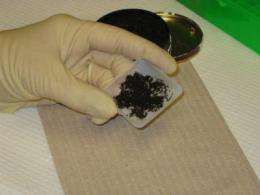Smokeless tobacco contains surprisingly high levels of certain toxic and cancer-causing substances. Credit: Keith Lindsey
A new study on the smokeless tobacco product called moist snuff — placed between lip and gum — has led scientists in Minnesota to urge the tobacco industry to change manufacturing practices to reduce snuff's content of carcinogens. Their study is published online in ACS' monthly journal Chemical Research in Toxicology.
It reports that this category of tobacco products contains surprisingly high levels of certain toxic and cancer-causing substances. Called polycyclic aromatic hydrocarbons (PAHs), they may contribute to carcinogenic effects associated with smokeless tobacco use.
Irina Stepanov and colleagues note that use of moist snuff increased by almost 80 fold between 1986-2003, partially because of the notion that it is safer then cigarettes. While smokeless tobacco use is indeed associated with lower risk of cancer as compared to cigarette smoking, it can lead to precancerous oral lesions and oral, esophageal, and pancreatic cancer. Only trace amounts of one of the PAHs has been reported to be present in smokeless tobacco prior to the recent discovery by Stepanov and colleagues that at least eight PAHs are present in smokeless tobacco. This finding inspired the new research.
The scientists analyzed the PAHs in 23 moist snuff samples that included various flavors of the most popular brands sold in the U.S. They identified 23 different PAHs in the samples, of which 9 are classified as carcinogens. They conclude that PAHs are one of the most abundant groups of cancer-causing substances in moist snuff. "Urgent measures are required from the U.S. tobacco industry to modify manufacturing processes so that the levels of these toxicants and carcinogens in U.S. moist snuff are greatly reduced," the article notes.
More information: "Analysis of 23 Polycyclic Aromatic Hydrocarbons in Smokeless Tobacco by Gas Chromatography-Mass Spectrometry", pubs.acs.org/stoken/presspac/p … ll/10.1021/tx900281u
Source: American Chemical Society (news : web)




















